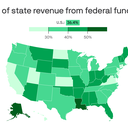Normal view
-
Latest News
- How to Watch HFX Wanderers FC vs Pacific FC: Live Stream Canadian Premier League, TV Channel
Poker Face Season 2 Release Date, Schedule, Where To Watch
Former AEW Star Announces Retirement
Hugh Jackman Had One Major Issue with 'Deadpool and Wolverine'
Iran Reaching 'Better Understanding' with US in Nuclear Talks—Diplomat
Republican Judge's Rebuke Shows 'Tide May Be Turning' Against Trump—Lawyer
JD Vance Has 'Exchange of Opinions' With Top Vatican Official
How much federal money your state gets
Federal funding makes up 40% or more of overall revenue in nearly half of U.S. states, per the latest available data.
Why it matters: The Trump administration and congressional Republicans are looking for ways to cut federal spending, and some states may be more vulnerable than others to major decreases.
By the numbers: As of 2022, federal funding accounts for the greatest shares of state revenue in Louisiana (50.5%), Alaska (50.2%) and Arizona (49.7%).
- It accounts for the smallest shares in North Dakota (22.2%), Hawai'i (25.9%) and Virginia (27.6%).
- That's according to a Pew Charitable Trusts analysis of the latest available census data.
Stunning stat: Total federal grants exceeded $1 trillion in 2022 for the first time, per Pew.
Context: Federal funding's share of overall revenue in any given state can fluctuate from year-to-year depending on overall federal spending levels, state tax collections and more.
- States have been getting more federal funding than usual in the past few years due to COVID-19 and infrastructure spending.
Reality check: Federal funds making up a high percentage of revenue isn't necessarily a problem for states, depending on their ability to raise money through taxes and other means.
- Yes, but: Big losses in federal dollars can leave states scrambling for alternate funding for federally-supported programs and projects, or cancel them entirely.
Case in point: FEMA is cutting $325 million in grants largely meant for flood mitigation in New York.
- "No state in the nation can backfill the massive cuts being proposed in Washington," New York Governor Kathy Hochul said in response earlier this month.
What we're watching: Whether the second Trump era results in a notable, broad decrease in federal funding to states — and how states react.


-
Latest News
- Anduril founder Palmer Luckey says the US should go all in on AI weapons since it already opened 'Pandora's box'
Anduril founder Palmer Luckey says the US should go all in on AI weapons since it already opened 'Pandora's box'

Sportsfile/Getty Images
- Anduril founder Palmer Luckey says the US shouldn't worry about developing AI weapons.
- Luckey said the US has already opened 'Pandora's box,' so it might as well go all in.
- The alternative is that China surpasses the United States in autonomous weaponry, he said.
Anduril founder Palmer Luckey says the US military already opened "Pandora's box" of AI and autonomous weapons, and it's too late to turn back.
During a TED Live event last week, Luckey said the United States should instead double down on developing AI-controlled weapons, otherwise China could outperform the United States in a future war fought with autonomous systems.
"I want you to imagine something," Luckey told the crowd. "In the early hours of a massive surprise invasion of Taiwan, China unleashes its full arsenal. Ballistic missiles rain down on key military installations, neutralizing air bases, and command centers before Taiwan could fire a single shot."
Luckey said that in this scenario, it would "become clear" that the United States does not have the systems to respond quickly enough to fend off China.
"This is the war US military analysts fear most, not just because of outdated technology or slow decision-making, but because our lack of capacity, our sheer shortage of tools and platforms means we can't even get into the fight," Luckey said.
He said the best way to compete with China is to win the AI arms race.
Luckey founded Oculus, which he later sold to Meta for $2 billion. Then, in 2017, Luckey founded the defense company Anduril, which produces and manufactures drones and other autonomous systems and weapons for the US military.
"I'll get confronted by journalists who say, 'Oh, well, you know, we shouldn't open Pandora's box,'" Luckey said. "And my point to them is that Pandora's box was opened a long time ago with anti-radiation missiles that seek out surface air missile launchers."
He added that some US military ships use anti-missile defense systems capable of "locking on and firing on targets totally autonomously."
"We've been in this world of systems that act out our will autonomously for decades," he said. "And so the point I would make to people is that you're not asking to not open Pandora's box; you're asking to shove it back in and close it again."

